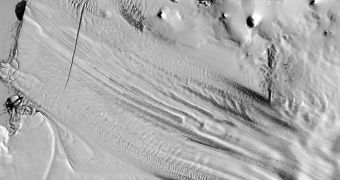An international team of researchers studying one of Antarctica's largest and most important ice fields has concluded in a new research that the Pine Island Glacier (PIG) has entered a period of self-sustaining, or irreversible, retreat. This means that the glacier will keep retreating for years to come.
The PIG is one of the main contributors to global sea level rises in Antarctica, and is responsible for draining massive amounts of ice in the Southern ocean every year. Researchers predict that discharges will increase significantly over the coming years, compared to the previous decade.
The investigation was led by experts with the Laboratoire de Glaciologie et de Géophysique de l'Environment (LGGE) at the CNRS-Université Grenoble Alpes. The team collaborated with colleagues from the University of Bristol, the University of Exeter, the British Antarctic Survey (BAS), and other partners in France and China for this investigation.
Details of the study were published in the January 13 issue of the top scientific journal Nature Climate Change. The paper again highlights the extent at which West Antarctica is losing ices compared to the eastern sections of the continent. The effect occurs despite seasonal variations in ice extents.
Scientists with the team say that PIG is responsible for a quarter of all ice losses in West Antarctica over the last decade. The entire glacier has receded by more than 10 kilometers (6.2 miles) during this interval, and the trend is likely to accelerate over the next 10 years, instead of abating.
“Over the last 30 years, Pine Island Glacier was the major contributor to sea level rise from Antarctica however it is unclear whether this will continue into the future. We have shown that the glacier’s current retreat will indeed continue for many decades,” says Tony Payne.
The expert holds an appointment as a professor of glaciology with the School of Geographical Sciences at the University of Bristol. Three ice evolution models agree that PIG will retreat for several tens of kilometers over the next few decades.
As a direct consequence, global sea levels are expected to increase by 3.5 to 10 millimeters over the next 20 years alone. While this may seem insignificant at first glance, the increase is relatively sharp, and occurs over a very narrow period of time.

 14 DAY TRIAL //
14 DAY TRIAL //